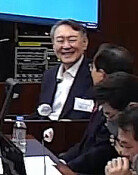Management Matters for Households As Well
Management Matters for Households As Well
Posted December. 31, 2004 22:54,
Cho Young-taek (37), a manager of the public relations division of Hyundai Development Company, is planning to be a night school student in a masters course majoring in the media at Korea University this March. For two-and-a-half years, he will invest two evenings every week and 12 million won in annual tuition fees in the school.
Cho said that he decided to take the course to enhance his competitiveness as the concept of lifetime employment has already disappeared and people aged 45 face early retirement.
A 45-year-old general manager of a small-and medium-sized company, who is identified by his family name Lee, decided to cut down on private education expenses for his two sons, a senior and freshman in middle school, by 30 percent to spend no more than 700,000 won per month.
Lee said that his family decided in a family meeting to reduce private education spending to save more money in preparation for possible early retirement and life after retirement.
Professor Seong Young-ae of the consumer and child studies department of Inchon University explained that Chos decision can be interpreted as an investment to enhance his value and the growth of his household economy, just like a company makes an investment in new technology and new business development.
She also said that Lee was trying to strengthen profitability by restructuring consumption, just like companies enhanced profitability by reducing unnecessary spending after the financial crisis in the late 1990s.
You can improve the stability of your household economy by preparing for possible job loss or retirement by cutting down on unnecessary spending. Experts say that households can adopt new management goals of companies like information management, transparent management, ethical management and fun management.
Kim Jong-soon, a researcher at the Korea Womens Development Institute, said that households should get diverse and correct information to develop the household economy and that every family member should participate in the decision-making process.
Woo Jae-ryong, president of Korea Fund Research, advised that households should efficiently distribute resources according to lifecycles and manage them with a long-term perspective.
It is fair to say that upgrading the household economy is essential, rather than optional. Forty or 38.1 percent out of 105 housewives attending the culture center of Shinsegye Department Store expect that their household income will decrease from last years. Seventy-nine, or 75.2 percent, of them said they were planning to reduce spending.
Gang Chang-hee, chief of the Mirae Asset Investment Education Institute, advised organized preparation, saying that low interest rates and the aging of society are powerful forces for change that affect the household economy.
Suk-Ho Shin Jung-Eun Lee kyle@donga.com lightee@donga.com




![두쫀쿠가 뭐라고…영하 8도에 아이들 1시간 줄세운 어린이집 [e글e글]](https://dimg.donga.com/c/138/175/90/1/wps/NEWS/IMAGE/2026/01/09/133126969.3.jpg)
![지하철 타고 가는 북한산성…외국인도 반한 ‘K등산 맛집’[전승훈 기자의 아트로드]](https://dimg.donga.com/c/138/175/90/1/wps/NEWS/IMAGE/2026/01/10/133120824.1.jpg)

